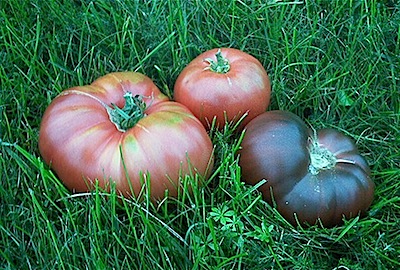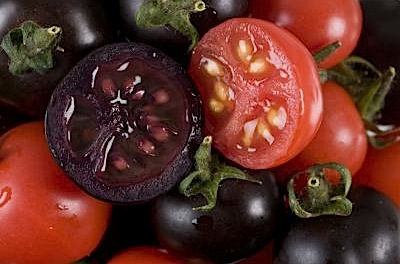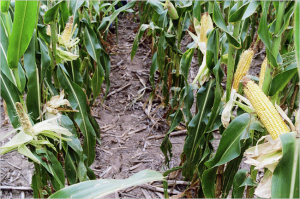I was going to do an in-depth analysis of a paper in tonight’s Nature Biotechnology, but it’s been a busy weekend and there are two press releases out there that do enough of a job on it for my purposes. From one:
Scientists have expressed genes from snapdragon in tomatoes to grow purple tomatoes high in health-protecting anthocyanins. … The scientists tested whether these elevated levels actually had an effect on health. In a pilot test, the lifespan of cancer-susceptible mice was significantly extended when their diet was supplemented with the purple tomatoes compared to supplementation with normal red tomatoes.
Mice given 10% of their diet in the form of powdered, freeze-dried purple tomato lived an average of 182 days, compared to 142 days for mice fed the same amount of freeze-dried red tomato or no supplement, which did not differ from one another. That’s great. Proof of concept, if you like.
From the other:
“The study” says Cathie Martin, FLORA project coordinator “confirms the latest research trends arguing that we can obtain significant beneficial effects by simple changes in our daily diet. We are not talking of pills or supplements but only food. It is worthy of notice that recommendations by worldwide governments risk to be unaccepted. The 5-a-day program promoted by the American National Cancer Institute 20 years ago does not seem to be very incisive and not just because of the lack of time. Financial crisis is giving an hand to the failure of good intentions mainly due to the expensive costs of fruits and vegetables. Research has to do something, has to find new ways to face the challenge. A solution may rely on concentrating in few but selected products the largest part of nutrients we should intake during the whole day”.
Researchers are clearly working hard to put anthocyanin genes into tomatoes, hoping, I suppose, that eventually people will eat those, or freeze-dried anthocyanin-rich genetically-engineered tomato powder, to ward off cancer. I wonder though, why they didn’t start with a naturally purple tomato and attempt to up-regulate the purple pigment genes. Too difficult? There are many such varieties, and I happen to be sensitized to them right now because in connection with something else I came across the Organic Seed Project, which lists “Improvement of Prudens Purple Tomato” as one of its Participatory Plant Breeding projects. Alas, that’s all it does. List it. Anyone know more?

The top photograph, from the research scientists, shows their very purple engineered tomato. The lower one, which has a very bluish cast, suggesting an excess of Photoshopping zeal, shows Prudens Purple in the centre and Black from Tula, a Russian variety, on the right. I’m not aware of any thorough measurements of anthocyanins in tomato varieties, though there is a wild relative with a gene that produces anthocyanin fruit. What is more, it has been conventionally-bred into domesticated tomatoes. We blogged it almost two years ago. I wonder why we have heard no more about it.
My point is not that there’s anything wrong with genetically engineered purple tomatoes. It is that lots of people may think there is. Indeed, and I know I’m going out on a limb here, such a belief may even be more common among those who are most likely to eat food-based dietary supplements to promote good health. So if researchers really want people to eat their tomatoes, why engineer them?


 Can biotech come to the rescue? This
Can biotech come to the rescue? This